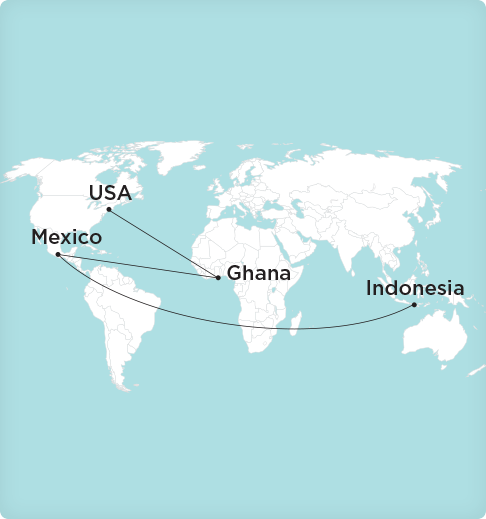Credits
16
Prerequisites
None
Courses taught in
English
Dates
Aug 30 – Dec 12
Program Countries
Ghana, Indonesia, Mexico
Program Base
USA, Ghana, Mexico, Indonesia
Visa
Required
Critical Global Issue of Study
Identity & Human Resilience

Through a life-affirming exploration of the meanings of death, examine how this “taboo” topic inspires artistic expression and social movements and reinforces cultural identities.
16
None
English
Aug 30 – Dec 12
Ghana, Indonesia, Mexico
USA, Ghana, Mexico, Indonesia
Required
Identity & Human Resilience
The subject of death is so taboo in American culture that people use metaphors to avoid talking about it while also using death-laden language in everyday communication. This contradiction leaves many Americans death illiterate, with limited functional knowledge of the process of death and dying, the psychology of bereavement, or end-of-life planning. Our heightened death avoidance also stilts our ability to engage each other past the boundaries of culture. Death is not only the grim and the grisly (though it can be that too). Death can also be a love story, a community story, a social and economic contestation, or a call to action. Studying death brings into view these wider aspects of the social experience. Travel to New York City and three countries with higher levels of death acceptance, Ghana, Mexico, and Indonesia, to understand how cultural practices, social policies, and creative communities confront and celebrate death.
Start in New York City where you will meet deathcare workers, dark tourism operators, community organizers, and spiritual leaders to understand death and dying on a neighborhood and national scale. In Ghana, explore how death may be viewed as a celebration of life, while investigating the ethics of dark tourism and how historical traumas impact Ghana and the U.S. Your next stop is Mexico where you will witness how Indigenous beliefs and Catholicism contribute to contemporary attitudes, rituals, and practices and how grassroots organizers advocate for people preparing to die. Lastly, in Indonesia learn about perspectives on death where the line between life and death lies in a gray area as shown through contemporary practices and traditional art.
Introduce yourself to death studies and explore death and dying around the world. Comparative death studies may expand or define new contours for your goals in public health, anthropology, sociology, mortuary science, philosophy, psychology, medical humanities, and more.
None
Students studying on this SIT semester-length program can choose to simultaneously complete a minor, with no additional coursework or cost. At SIT, a minor is a minimum of 16 credits taken within a content area. This standout credential can help boost your future job or graduate school applications.
The global studies minor examines the interconnectedness of people, places, and systems across the world, exploring global issues through cultural, sociological, and historical lenses. The medical humanities minor explores the human experience through interdisciplinary study in literature, history, culture, philosophy, and the arts.


As ground zero of the 9/11 attacks and a city hit severely by the COVID-19 pandemic, New York City has stories to tell about death and dying on a neighborhood and national scale. You will visit the mausoleums of Gilded Age families, learn about the mass graves on Hart Island, and travel through NYC’s boroughs (and Westchester County) as you explore program themes. Meet with deathcare workers, forensic examiners, dark tourism operators, community organizers, and spiritual leaders to learn what it means to die in the city that never sleeps.
Death in multiethnic Ghana is a site of transformation and revitalization. Between the decorative fantasy coffins that symbolize the deceased, dancing pallbearers, week-long feasts, and still-present ancestors, death is truly a celebration of life. But buried not far beneath the spectacle of public mourning are national and geopolitical legacies of death and dying. Witness how historical traumas continue to impact both Ghana and the U.S. as you journey to Elmina Castle and the Cape Coast, major centers for the transatlantic slave trade, and contemplate how people’s agencies may create new destinies for death.
Mexico’s vibrant death culture is so unique and well-known that it is easily associated with national identity. Though good for tourism, the abundance of sugar skulls colorfully masks the socio-political determinants of death faced by the Mexican people. Go beyond el Día de los Muertos (the Day of the Dead) to see how the syncretism of Indigenous beliefs and Catholicism results in contemporary attitudes, rituals, and practices. Explore Monte Albán, San José Mogote, and Mitla as history-crystalizing cities of the dead. Unpack how policies – domestic and foreign – perpetuate systems that devalue human life. Be inspired by the work of grassroot organizers who advocate for life at the border of death.
Death in Indonesia is as diverse as its islands and people. From Balinese cremation ceremonies to Torajan funerals, death practices across Indonesia reinforce and differentiate community and cultural identity. You will learn perspectives on death from spiritual leaders, community members, artists, and activists. In many cases, the line separating life and death is permeable, as evidenced in contemporary practices and represented through traditional arts. This gray area, however, is problematic when it comes to tourism, representation, and disparate valuations of life, reflected in the demography of national mortality rates.
Please note that SIT will make every effort to maintain its programs as described. To respond to emergent situations, however, SIT may have to change or cancel programs.
Upon completion of the program, students will be able to:
The following syllabi are representative of this program. Because courses develop and change over time to take advantage of dynamic learning opportunities, actual course content will vary from term to term.
The syllabi can be useful for students, faculty, and study abroad offices in assessing credit transfer. Read more about credit transfer.
Dying to Know: Interdisciplinary Seminar on Death – syllabus
(IDST3500 / 4 credits)
This core interdisciplinary seminar takes the conversations of critical death studies and expands them across the globe. Students will learn about the rise of the death avoidant attitudes, the operations—and exploitations—of deathcare industries across cultural contexts, the forensic and social post-mortem processing of the dead body, and the revitalization movements that shape new ways of dying for the future. Students will engage with diverse texts/media that reflect, shape, and challenge attitudes toward death and dying. The course will also examine death within subcultures, including informal death practices, roadside memorials, memorial tattoos, and virtual in memoria. Counterbalancing these texts will be experiential learning opportunities to trace out deathways and acquire practical information about death, dying, and bereavement. Through these multipronged lines of inquiry, the course will equip students with the functional knowledge and skills to integrate end-of-life planning into their life and career plans.
Cross-cultural Perspectives on Death, Dying, and Bereavement – syllabus
(ANTH3000 / 4 credits)
Although death is universal, there is no universal experience of death and dying. Dissatisfaction with deathways at home has led many to imagine othered, better deaths elsewhere. This course demystifies “the elsewhere”. This course explores death, dying, and bereavement from the perspective of comparative cultural anthropology with an emphasis on beliefs, ontologies, funerary rites, and post-mortem practices. The course will broadly survey death and dying from different regional and cultural contexts accompanied by in–depth exploration of the attitudes, symbols, and practices of the host locations. Course content will also delve into death-related superstitions and alternate discourses. Topics will include the role of religion, philosophy, Indigenous knowledge, and historical events in determining the meaning of death. Through the process of learning anthropological perspectives in the context of death practices, the course will challenge imagined indigeneities and clarify how explorations of the unfamiliar may operate as a reflexive tool to show that a person’s own culture or worldview is one among many, rather than a norm through which difference is understood.
Sociology of Death: Deaths that Count and Lives that Matter – syllabus
(SOCI3000 / 4 credits)
Death comes to us all—but not equally. This course examines necropolitics and the inequalities of death across age, gender, sexual orientation, race, ethnicity, and social class. Deep dives into global, national, and local mortality rates and leading causes of death will provide insight into whose lives matter, prompting a closer examination of the policies that preserve life for the privileged few and perpetuate death for the marginalized masses. Along the way, we will learn from activists and educators who are advocating for equitable living conditions and life-affirming social change. We will also look at deaths that moved people into action.
Project Death: Community Engagement and Ethical Inquiry – syllabus
(ISIH3000 / 4 credits)
This course incorporates two modalities of project-based learning—community action and self-directed inquiry—to enhance students’ understanding of death and dying. Project Death is an uncommon opportunity for students to curate their own engagement with death through research, partnership, and creative or academic outputs. At each location, students will have opportunities to engage with local organizations and contribute to relevant community-initiated projects. Through their participation and guidance from host communities and partners, students will gain experience in respectful collaboration and intercultural communication as they gain insights into how local communities care for their dead, dying, and bereaved. Students will further apply what they have learned about ethical and appropriate engagement with host communities to their inquiry-based projects wherein they explore divergent responses to their research questions. Through these forms of project-based learning, students will develop a holistic and informed perspective on death and dying.



SIT Study Abroad is committed to ensuring that international education is within reach for all students. We believe in the transformative power of immersive, intercultural experiences and are dedicated to supporting students in their educational journey.
See All Costs

Students are required to obtain a visa for this program. Your admissions officer will provide you further guidance on the process and support documents. Please do not apply without instructions from your admissions officer.
Hear from SIT’s Academic Dean of Assessment and Learning Support, Dr. Kathryn Inskeep, who was instrumental in creating IHP Death & Dying, to learn more about the purpose of the program and who should participate.